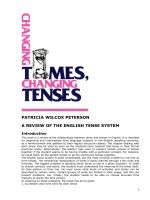Tense consolidation - Future time
Bạn đang xem bản rút gọn của tài liệu. Xem và tải ngay bản đầy đủ của tài liệu tại đây (3.33 MB, 14 trang )
Advanced Language Practice
Unit 2 Tense consolidation:
future time
Basic contrasts:
will, going to,
present
continuous
1 Will is normally known as the predictive future, and describes known facts,
or what we suppose is true.
I’ll be late home this evening.
The company will make a profit next year.
This can also take the form of an assumption:
That'll be Jim at the door.
This means that I suppose it is Jim.
2 Will is also used to express an immediate decision:
I’ll take this one.
Decisions expressed with going to refer to a more distant point in the
future.
Other uses of will and shall are in Units 11 and 12.
Exercises
Exit
Contents
Previous unit Next unitBack Next
Advanced Language Practice
3 Be going to describes intentions or plans. At the moment of speaking the plans
have already been made.
I’m going to wait here until Carol gets back.
Going to is also used to describe an event whose cause is present or evident.
Look at that tree! It's going to fall.
Decisions expressed with going to refer to a more distant point in the future.
Other uses of will and shall are in Units 11 and 12.
4 Present continuous describes fixed arrangements, especially social and travel
arrangements. A time reference is usually included.
5 Contrasts between going to and will may be a matter of speaker preference.
The first two examples in 1 would not seem inappropriate if going to was
used, possibly because the sense of the cause is present in the speaker's mind.
Exit
Contents
ExercisesNext unitBack NextPrevious unit
Advanced Language Practice
Future continuous 1 This describes an event which will be happening at a future point.
Come round in the morning. I’ll be painting the kitchen.
2 It can also describe events which are going to happen anyway, rather than
events which we choose to make happen.
I won't bother to fix a time to see you, because I’ll be calling into the
office anyway several times next week.
3 In some contexts future continuous also sounds more polite than will.
Will you be going to the shops later? If you go, could you get me some
potatoes?
4 It can also be used to refer to fixed arrangements and plans.
The band will be performing live in Paris this summer.
Exit
Contents
ExercisesNext unitBack NextPrevious unit
Advanced Language Practice
Future perfect
Other ways of
referring to
the future
1 This has both simple and continuous forms, and refers to time which we look
back at from a future point.
In two years' time I'll have finished this book.
By the end of the month, I'll have been working for this firm for a year.
2 It can also be used to express an assumption on the part of the speaker.
You won't have heard the news, of course.
This means that I assume you have not heard the news.
1 Is / are to be
This is used to describe formal arrangements.
All students are to assemble in the hall at 9.00.
See also Units 11 and 12 for uses expressing obligation.
2 Be about to, be on the point of, be due to
Be about to and be on the point of both refer to the next moment.
I think the play is about to start now.
Mary is on the point of resigning.
Exit
Contents
ExercisesNext unitBack NextPrevious unit
Advanced Language Practice
Be due to refers to scheduled times.
The play is due to start in five minutes.
Ann's flight is due at 6.20.
3 Present simple and present perfect
Present simple is used to refer to future time in future time clauses.
When we get there, we'll have dinner.
Present perfect can also be used instead of present simple when the completion
of the event is emphasised.
When we've had a rest, we'll go out.
4 Present simple is also used to describe fixed events which are not simply the
wishes of the speaker.
Tom retires in three ?ears.
Similarly, calendar references use the present simple.
Christmas is on a Tuesday next ?ear.
It's all go - next week I have my operation; then the week after that I go on
holiday...
Exit
Contents
ExercisesNext unitBack NextPrevious unit









